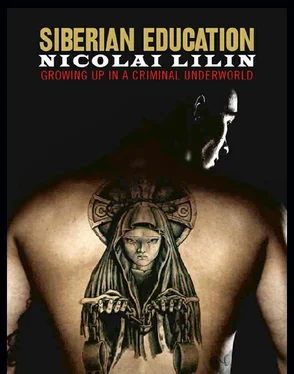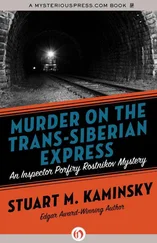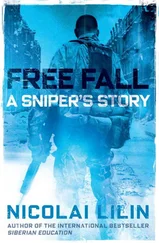When we touched the bank, Mel jumped down from the boat and said he wanted to go and see an old aunt of his who lived not far away and always complained that nobody went to visit her. I decided to go and see Grandfather Kuzya, to tell him about everything that had happened to us.
In the community of the Siberian Urkas the greatest importance is attached to the relationship between children and old people. As a result there are many customs and traditions which make it possible for elderly criminals with great experience to participate in the education of children, even if they have no blood relationship with them. Each adult criminal asks an old man, usually one who has no family and lives on his own, to help him in the education of his children. He often sends his children to him, to take him food or give him a hand about the house; in exchange the old man tells the children the stories of his life and teaches them the criminal tradition, the principles and rules of behaviour, the codes of the tattoos and everything that is in any way connected with criminal activity. This kind of relationship is called in the Siberian language ‘carving’.
The word ‘grandfather’ in the Siberian criminal community has many meanings. The grandparents are naturally the relatives, the parents’ parents, but also the highest Authorities in the criminal world – in this case the word ‘Holy’ or ‘Blessed’ is prefixed to ‘grandfather’, so that it is immediately clear that the person under discussion is an Authority. An elderly educator, too, is called grandfather, but never grand-father alone: his name or nickname must always be added.
My very personal and dearly loved educator was, as will have become clear by now, Grandfather Kuzya. As far back as I can remember, my father always took me to see him. Grandfather Kuzya was highly respected in the criminal community, and he had earned this respect partly through the sorrows and sacrifices he had undergone for the sake of the community.
Grandfather Kuzya was ageless. His mother had died when he was very small and his father had been shot not long afterwards, and the family that had adopted him never knew exactly how old he was.
As a young man Grandfather Kuzya had belonged to a gang of Urkas led by a famous criminal called ‘Cross’, a man of old Siberian faith who had opposed first the power of the tsar and later that of the communists. In Siberia, Grandfather Kuzya explained to me, no criminal ever supported a political force; everybody lived only following their own laws and fighting any government power. Siberia has always been coveted by the Russians because it is a land that is very rich in natural resources. Besides the fur-bearing animals, which in Russia are considered a national treasure, Siberia had large amounts of gold, diamonds and coal; later oil and gas were discovered too. All governments have tried to exploit the region as much as possible – of course without the slightest regard for the population. The Russians would arrive, said Grandfather Kuzya, build their towns in the middle of the woods, dig up the land, and carry off its treasures on their trains and ships.
The Siberian criminals, expert robbers whose ancestors had for centuries attacked the mercantile caravans coming from China and India, had had no difficulty in attacking the Russian ones too.
In those days the Urkas had a particular philosophy, a world-view, which they called the ‘Great Pact’. It was a plan which made it possible to maintain a concerted resistance against the government. According to the old criminal law, each individual gang could carry out no more than one robbery every six months: in this way the quality of criminal activity was kept at a high level, because it is clear that if a group has only one chance to rob a caravan, it must prepare well and take no risks, avoiding any false moves. People were keen to organize the job well, otherwise they would have to go half a year without eating. The Great Pact eliminated this rule, allowing the gangs to carry out robberies continually, because the aim was not that of self-enrichment, but of driving the Russian invaders out of Siberia. Old criminals joined forces with the new ones, forming very large gangs. The most famous were those of Angel, Tiger and Tayga.
Cross had a smaller gang, comprising about fifty men. They robbed trains and the small ships that plied from the diamond mines on the River Lena to southern Siberia, and to the region called Altay. One day they made the mistake of coming out of the woods, and ran into the forces of the communist army. They tried to resist but in the end were outnumbered by the communists: they were surrounded, and almost all of them died in battle.
The Urkas never surrendered; to them it was unworthy to be captured, so if they saw that the situation was hopeless they would say their farewells, wish each other good fortune and plunge into the fray, until the enemy killed them. The only possibility of surviving was to be captured because of your wounds: to be wounded and taken prisoner was not considered unworthy.
In that battle three young Urkas were captured. One of them was Kuzya; he had taken a blow to the head and passed out. The communists, to show all the Siberians how those who opposed the government were treated, immediately ordered an exemplary ‘people’s’ trial for the prisoners in the town of Tagil, where the population had surrendered to the Russians, who had set up military barracks and police stations everywhere.
Many people attended the trial, because many Siberians sympathized with the Urkas and supported their struggle against the communists.
The judge and his ‘jury’, made up of ‘representatives’ of the people, and naturally all communists, sentenced all three to death. The sentence was to be carried out the following day by firing squad, in front of the walls of the old railway station.
Next day the place was full of people. Many had brought icons and put crosses outside their shirts, to emphasize their aversion to the communist regime. The women wept and asked for a pardon, the men prayed to the Lord to welcome those three slaves of His who were about to be killed unjustly. The atmosphere was very tense, and reinforcements had been sent from the police station with orders to go into action should the people become dangerous.
At last the criminals were driven up, taken out of the car and made to stand up, in chains. They were led before the judge and the public prosecutor, who read out to them all the charges which the Soviet government had brought against them. Then the judge read out the sentence and authorized the police to carry it out at once.
The three were placed with their backs turned and their faces against the wall, but none of them wanted to stand in that position, so they turned around to face the firing squad. Some of the crowd threw crucifixes onto the ground near the criminals’ feet, praying to the Lord to make the authorities pardon them.
The commander of the firing squad gave a series of orders to his men, who prepared their rifles, took aim at their targets and fired. Two condemned men fell dead on the ground, but the third, the one in the middle, continued to stand up and look at the people. His shirt was soaked with blood and he had eight wounds in his body, but he didn’t fall; he stood motionless, breathing in the cold morning air deeply. It was Kuzya, the young Siberian Urka.
According to the rules of the Soviet state the death sentence could only be carried out once; if the condemned person survived he must be set free. For this reason, years later the communists took to shooting the condemned prisoners from half a metre away and straight in the head – to remove all possible doubt.
The people went wild with joy; to them Kuzya became a symbol, living proof of the existence of God, who had heard their prayers and shown His powers. From that day on every Siberian knew the story of Kuzya and referred to him as ‘the Marked One’.
Читать дальше










